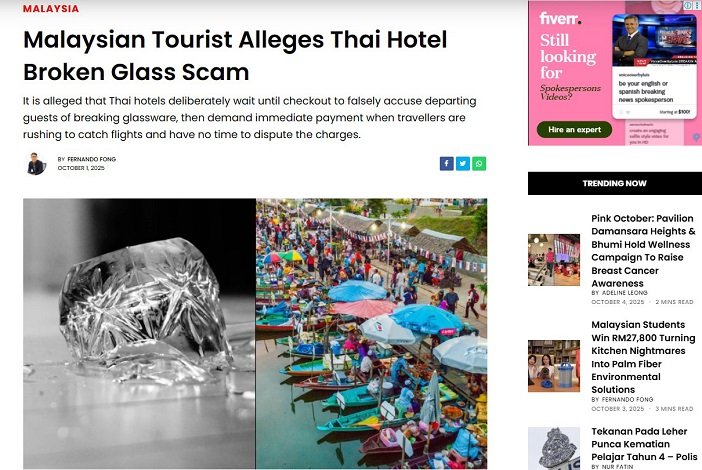Key points
- Instead, Thai tourism insiders and authorities believe this could be part of a broader online disinformation campaign aimed at undermining confidence in southern Thailand’s booming hospitality industry—particularly in destinations like Hat Yai, Songkhla, and Betong, which have seen a sharp rise in Malaysian arrivals this year.
- “This appears to be a misunderstanding that has been exaggerated online,” said a senior manager at a prominent Hat Yai hotel.
- The baseless “broken glass” accusations serve as a reminder that false social media posts can cause real harm to small businesses and tourism communities that rely on cross-border cooperation and goodwill.
Thailand Hotel News: Thai Hospitality Industry Faces Coordinated Smear Campaign
Thailand’s southern tourism sector is once again under fire following viral allegations made by a Malaysian traveller who claimed that Thai hotels were running a so-called “broken glass scam.” The post, made by a Malaysian woman named Nina Mei, has sparked outrage online, but closer examination reveals no verifiable evidence to support her claims.

Thai officials and tourism leaders reject viral Malaysian claims as baseless attempts to
tarnish Thailand’s hospitality reputation.
Image Credit: TRP
Instead, Thai tourism insiders and authorities believe this could be part of a broader online disinformation campaign aimed at undermining confidence in southern Thailand’s booming hospitality industry—particularly in destinations like Hat Yai, Songkhla, and Betong, which have seen a sharp rise in Malaysian arrivals this year.
According to this Thailand Hotel News report, the allegations emerged after Nina’s Facebook post accused two unnamed hotels of falsely claiming she broke glassware and charging her 60 baht (about RM7.78) during checkout. She went further, suggesting that Thai hotels routinely exploit departing guests by making fake claims when travellers are pressed for time before flights. However, Thai hotel associations, tourism police, and several Malaysian travel agencies that work directly with hotels in southern Thailand have firmly refuted these claims, stating that no such systematic scam exists.
No Credible Evidence Behind the Claims
Thai Tourism Police confirmed that no official complaints have been lodged by Malaysian travellers regarding such incidents, despite millions visiting Thailand every year. The Thai Hotel Association (Southern Chapter) added that most hotels follow strict operational protocols—guest rooms are checked in the presence of cleaning staff, and guests are informed of any damage immediately, not after checkout. “This appears to be a misunderstanding that has been exaggerated online,” said a senior manager at a prominent Hat Yai hotel. “We have CCTV in all corridors, detailed room inspection logs, and receipts for all transactions. There is no basis to these allegations.”
Meanwhile, Malaysian tour operators who bring thousands of tourists across the border each month also dismissed the claims, emphasizing that the Thai hospitality industry remains professional, transparent, and welcoming. “It’s possible that a small misunderstanding was taken out of context,” said a tour coordinator from Penang. “We’ve never encountered anything resembling what was described in the viral post.”
Tourism Experts Warn of Possible Misinformation Drive
Several Thai tourism experts and analysts have warned that coordinated online misinformation campaigns are increasingly targeting Thailand’s key industries, including tourism. Some suggest that politically or commercially motivated groups in Malaysia may be spreading fabricated stories to discourage cross-border travel and divert tourism traffic elsewhere. Such incidents are not new—Thai authorities have previously had to counter social media hoaxes claiming hotel overcharging, taxi scams, and other unfounded accusations.
Thailand’s Tourism Industry Remains Strong
Despite the baseless allegations, Thailand continues to be a preferred destination for Malaysians. Over 4 million Malaysian visitors have entered the kingdom in 2024 alone, drawn by affordable travel, warm hospitality, and cultural proximity. Industry leaders encourage travellers to continue visiting with confidence, reminding them to verify any viral claims before sharing them online.
The baseless “broken glass” accusations serve as a reminder that false social media posts can cause real harm to small businesses and tourism communities that rely on cross-border cooperation and goodwill. Thailand’s hospitality sector remains one of the most professional in Asia, with a long-standing reputation for integrity and excellent service. Travellers are urged to focus on verified information and continue enjoying all that southern Thailand has to offer.
Reference:
For the latest false allegations against hotels in Thailand, keep on logging to Thailand Hotel News.

